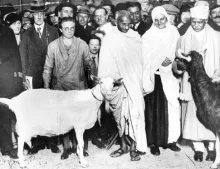Gandhi was famous for his penchant for goat's milk. He even had a pet goat named Nirmala who sometimes travelled with him and when she didn't, his well-wishers organised goats to supply him with fresh milk. In fact, his trip to Europe and London for the Round Table Conference in 1931 was aided by a number of generous local nannies.
This penchant of Gandhi's was, however, a reluctant one. He had earlier forsworn the drinking of milk as part of his personal philosophy. But at some point just before the times of the Rowlatt Act of 1919, he fell direly ill. His doctor informed him that it was necessary for him to consume milk to recover. When Gandhi apprised him of his vow to avoid the milk of cows and buffaloes, Kasturba, his wife, chirped in saying that he could then consume goat's milk and still keep his promise. Gandhi allowed himself to be persuaded even though he realised that he was breaking the spirit of his vow. (In his autobiography, he chides his own hypocrisy and asks for knowledgeable readers to suggest nutritious vegetable alternatives to goat's milk.)
A 1924 book titled Crime in India suggests that not all Indians were conscientious participants in Gandhi's Non-cooperation Movement of c.1921. This was at least a couple of years after his aforementioned dietary concession and the goat's milk meme had presumably spread far and wide by then. One of the anecdotes in the 1924 book recounts an incident in Bilaspur (now in Chhattisgarh) where a few Muslim butchers toured the countryside spreading the rumour that all goats in the country were to be set free after Dussehra by Gandhi's order. This triggered a mild panic in the region creating a slump in the market price of goats. The butchers were then able to acquire a large quantity of live stock at a heavy discount for a substantial later profit!

